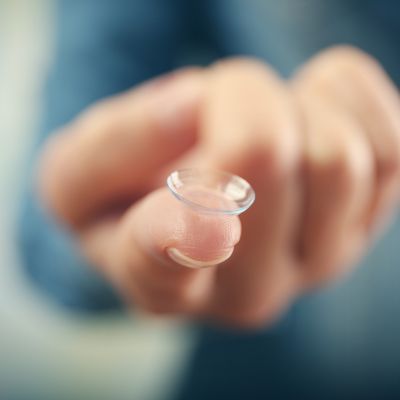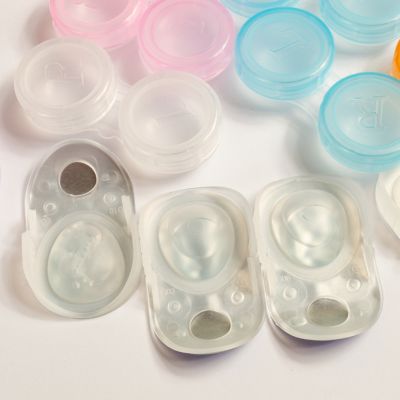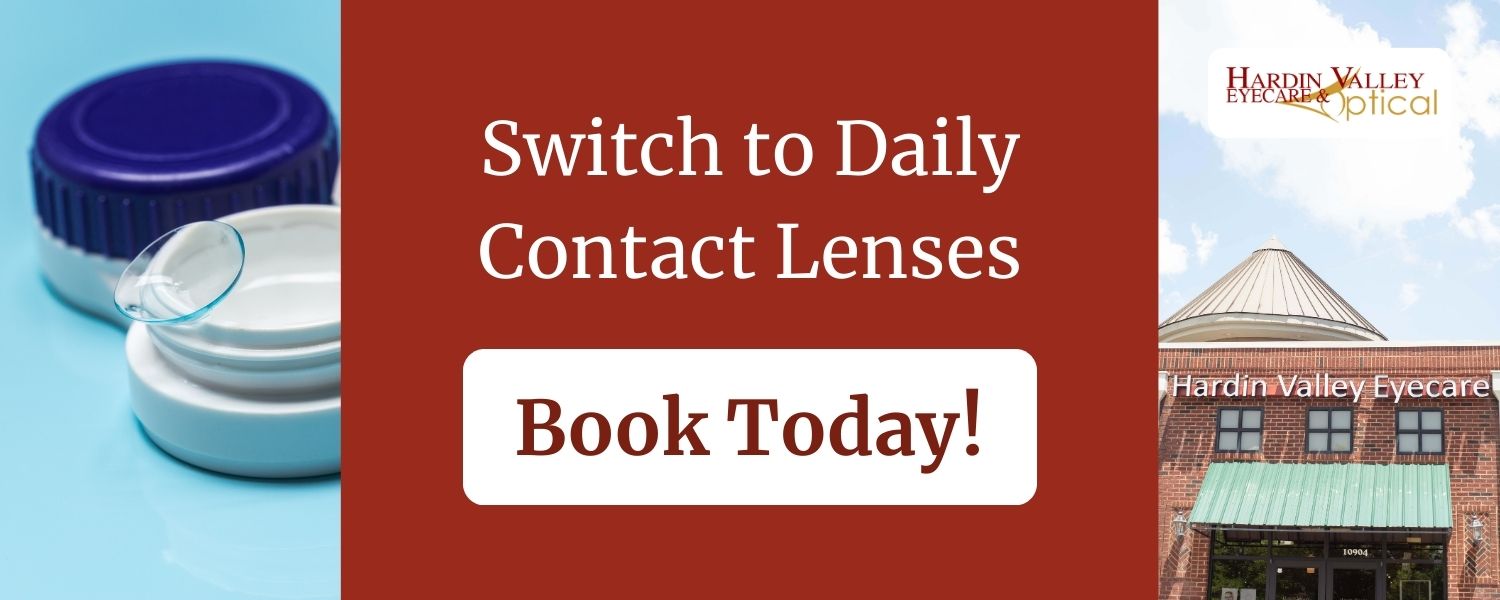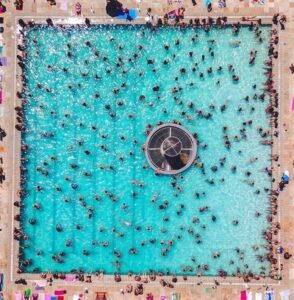It may be tempting after a long, hard day to go to bed without taking your contacts out. In moments like these, you may wonder, “Can you sleep with contacts in?” The truth is that sleeping with contacts raises your risk of vision problems.
Sleeping in your contacts raises the risk of eye infection and worse complications. You may need surgery and you could even develop vision loss. To protect your vision, follow our tips for responsible contact-wearing. This includes switching to daily contacts and wearing UV-blocking sunglasses.
Can you sleep with contacts in?
No, you should never sleep in contact lenses and they are not intended for continuous wear. It may not seem like a big deal, but falling asleep with your contacts increases your risk of infection. According to the Centers for Disease Control (CDC), wearing contacts while sleeping raises the risk of infection 6 to 8 times.
1 in 3 contact lens wearers sleep in their contacts, whether it’s on purpose or if they accidentally fall asleep. This means that contact lens-related infections are more common than you may think. Infections are even more likely if you’re not using good cleaning habits and caring for your contacts the way you should. This can result in microbial keratitis, which is an infection that affects the cornea of your eye.
Treating these conditions can be time-consuming and expensive. You’ll need medicated eye drops to treat your infection and follow-ups with your eye doctor. This can take weeks or months, so it’s important to remove your contacts before bed. Make sure to clean them properly and avoid the risk of infection.
Getting an eye infection is bad enough, but severe cases can be even more dire. They can have serious complications including vision loss and may require surgery. Remember that contacts are not intended to be worn continuously. Be sure to practice good eye health hygiene and protect yourself from serious side effects.
Tips for Wearing Contact Lenses

We’ve answered the question, “Can you sleep with contacts in?” Now let’s look at some of our favorite tips for wearing contacts safely. There’s a learning curve to wearing contacts. Unlike prescription eyeglasses, contact lenses need more care and consideration. Most of this will become like muscle memory as you make them a part of your daily routine.
Yet, there are some considerations that you may not know or may have forgotten over time. Here are a few important tips on wearing contact lenses and getting the most out of them.
1. Switch to Daily Contact Lenses
Daily contact lenses have a ton of benefits. Also known as daily wear contacts, you wear these lenses for one day and then throw them away. This reduces the time that you’ll spend each evening (or whenever you decide to fall asleep) cleaning them.
Daily lenses have plenty of other benefits besides shortening your nightly routine. Made from newer materials such as silicone hydrogel, they can also help with:
- Seasonal allergies
- Dry eyes
- Astigmatism
Daily contacts help fight seasonal allergies by preventing pollen and other residue buildup. Regular cleaning can remove a lot from traditional and extended-wear contact lenses. Unfortunately, cleaning can’t get it all. This causes buildup over time which you can avoid with daily contacts.
Learn about seasonal allergies and contacts for more tips.
Dry eyes often come with seasonal allergies, but they can be a year-round problem if you wear contacts. This is due to residue sticking to your lenses, preventing moisture from getting to your eyes. The result is sensitive eyes that feel irritated or gritty. Daily contacts give your eyes a break and allow them to get much-needed moisture and oxygen.
Astigmatism causes blurred vision and other problems. This is due to a misshapen lens or cornea, making it difficult to focus light on the retina. Fortunately, daily contacts formulated for astigmatism are available to help you see clearly.
2. Don’t Wear Contacts While Swimming or Showering

You should avoid getting your contacts wet while wearing them. Swimming is especially dangerous since bacteria can become trapped inside the lenses. This opens you up to all sorts of infections and other vision problems.
Be especially wary of:
- Lakes
- Rivers
- Oceans
- Hot tubs
These bodies of water can have more contaminants than swimming pools. Chlorinated pools aren’t that much safer. They may kill a lot of bacteria and other pathogens, but they can’t get them all.
Some patients ask, “Can you shower wearing contacts?” Even tap water from your shower poses its own dangers. The CDC has warned contact wearers about an amoeba known as Acanthamoeba. It lives in all types of water but is especially prevalent in tap and well water. Dailies are great for keeping bacteria and other debris from collecting on lenses over time.
Learn everything you need to know about daily contact lenses.
3. Wear Sunglasses
UV exposure has been connected to eye care problems including cataracts and photokeratitis. Some contact lens manufacturers have started adding UV blockers to contacts. However, it’s no replacement for sunglasses. Another issue is that contacts aren’t big enough to protect your entire eye. You’ll need UV-blocking sunglasses to protect them year-round.
When choosing a pair of sunglasses, look for a pair that:
- Blocks 99 – 100% of UVA and UVB rays, or are rated UV400 or higher
- Fit comfortably close to your face to prevent UV rays from slipping through
- You can see through clearly and don’t distort your vision
UV radiation is a threat all year long and not just during spring and summer. Take the time to find a quality pair of sunglasses that are ready for any occasion.
Want to know more about how disposable lenses can help keep your eyes healthy? Contact us today to schedule your appointment!
Can you sleep with contacts in? Definitely not. Doing so can lead to an eye infection and other complications such as vision loss. Switch to daily contacts to protect your vision. You should also avoid exposing your contacts to water. To protect your eyes from the sun, invest in a quality pair of UV-blocking sunglasses.
Hardin Valley Eyecare & Optical has been serving Knoxville since 2009. Located at 10904 Spring Bluff Way, you can schedule an appointment online or give us a call at (865) 888-0892.
* This blog was originally published in June 2021 and has been updated for clarity and freshness.






